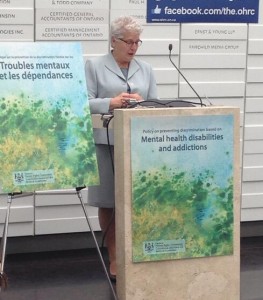On June 18, the Ontario Human Rights Commission (OHRC) launched its policy on preventing discrimination based on mental health disabilities and addictions. The policy reflects the OHRC’s interpretation of the Ontario Human Rights Code (the Code) with respect to mental health (MH) disabilities and addictions, and provides standards, guidelines and best practice examples. The launch event featured OHRC Chief Commissioner Barbara Hall as well as speakers from the Dream Team, Empowerment Council and Ryerson University. 
Image courtesy of OHRC on Twitter.
This new policy has been under development for several years and included a number of formal and informal consultation processes. The final policy addresses a number of specific issues related to human rights, mental health and addictions, including:
- Rights of people with mental health disabilities under the Code, especially as they relate to employment, housing and service delivery
- The right to be free from reprisal when exercising rights under the Code
- Different kinds of discrimination
- Principles of accommodation
- How the duty to accommodate applies with respect to mental health disability and addictions
- Duties and responsibilities related to accommodation
- Possible limits on the duty to accommodate, including considerations for assessing whether the test for undue hardship has been met
- Balancing the rights of people with mental health disabilities when those rights may conflict with rights of others
- Right to be free from discrimination in programs targeting people with mental health disabilities
- Determinations of consent and capacity and rights under the Code
- Responsibilities of organizations to prevent discrimination
The policy development involved consultation with more than 1,500 people and organizations across the province resulting in the release of a written document, Minds that Matter: Report on the Consultation on Human Rights, Mental Health and Addictions, that tracked the significant discrimination and harassment faced by people with mental health disabilities and addictions.
The Ontario Human Rights Code offers important protections to people with mental health disabilities and addictions.
CMHA Ontario is pleased to have participated in the development of the Commission’s policy and supports its launch. CMHA Ontario played a part in the policy’s development by consulting with people with lived experience of mental health disabilities and the provincial human rights system, and by providing information and best practice examples for mental health accessibility or accommodation. We are pleased that CMHA Ontario is reflected in a best practice examples through our work with Elections Ontario to increase accessibility of the voting process to people with mental health disabilities.
People with mental health disabilities and addictions face significant discrimination, stigma and social exclusion in Ontario. The Ontario Human Rights Code offers important protections to people with mental health disabilities and addictions and the Commission’s policy will help individuals and organizations to better understand rights and obligations
CMHA Ontario’s ongoing partnership with OHRC is reflected in our collaborative work on the Think Outside the Box project, through which we are developing a web-based resource about mental health, human rights and accessibility.
To learn more, please read the OHRC’s new policy on preventing discrimination based on mental health disabilities and addictions.